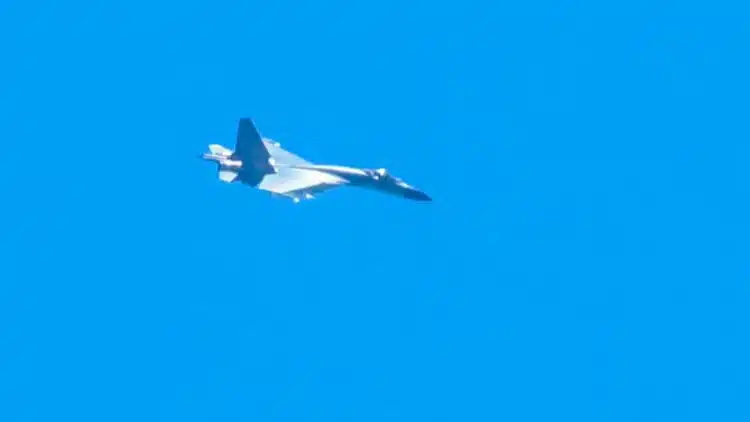Invasion of Taiwan’s sovereign airspace by Chinese fighter jets or drones will be considered a “first strike,” Taiwan’s Defense Minister said on Wednesday, as the island strives to beef up its defenses in response to Beijing’s military push.

Taiwan’s Ministry of Defense has stated that any Chinese fighter jets or drones that violate Taiwan’s territorial airspace will be considered a “first strike.” Taiwan’s Defense Minister, Chiu Kuo-cheng, made the statements while speaking to MPs on the threats posed by Beijing’s recent string of aggressive moves, which saw Chinese fighter jets and drones fly near the self-governing island nation, even entering into its airspace, according to CNN.
Taiwan’s Defense Minister stated on Wednesday that the island nation intends to strengthen its defenses in response to China’s escalating military pressure in the region.
Defense Minister Chiu Kuo-cheng made the statements while speaking to legislators about the threats posed by China’s recent escalation of actions, which have included Chinese airplanes and drones flying close to the self-governing island.
Chiu did not say how Taipei would react if People’s Liberation Army planes crossed the territorial line, which is defined as 12 nautical miles (22.2 kilometers) from the island’s coasts.
Taiwan Military

“In the past, we declared we wouldn’t be the first to attack, which meant we wouldn’t fire the first shot without (China) first firing artillery shells or missiles,” Chiu Kuo-cheng explained.
“However, the meaning has clearly changed, as China has deployed measures such as drones.” So we’ve modified it, and any crossing of aerial entities (into Taiwan’s territorial airspace) will be treated as a first strike,” Chiu said during a meeting of the Legislature’s Foreign and National Defense Committee.
Taiwanese President Tsai Ing-wen declared earlier this year that the island’s military will take “necessary and forceful responses as warranted” against what was dubbed Chinese grey zone warfare methods, such as “drone harassment.”
We will not provide China with justification for starting a conflict. Tsai stated, “We will not encourage war and will be cautious, but it does not imply we will not retaliate.”
When pressed by lawmakers on Wednesday, Chiu stated that Taiwan’s military “definitely has its red line” when it comes to the island’s defense and that if the red line is crossed, the military will launch “countermeasures,” without specifying what the red line is or what those countermeasures will be.
CNN has requested comment from China’s Foreign Ministry and is awaiting a response.
Taiwan is only approximately 110 miles (177 kilometers) from the coast of China. Despite the fact that the two parts have been handled separately for more than 70 years, China’s ruling Communist Party continues to claim the island as its own despite never having controlled it.
Xi Jinping, China’s leader, has stated that “reunification” between China and Taiwan is unavoidable and has refused to rule out the use of force.
Tensions between Beijing and Taipei are at an all-time high, with the Chinese military conducting huge military drills near the island.
Following US House of Representatives Speaker Nancy Pelosi’s visit to Taiwan in early August, China increased military pressure on the island, sending fighter jets across the Taiwan Strait, the body of water dividing Taiwan and China.
The median line had acted as an informal dividing line between the two for decades, with military assaults across it being uncommon. But, according to Chiu, Beijing has “shattered” the understanding. He asserted that China has altered the status quo and is welcoming a new normal.
Chiu’s words add to the delicate security situation across the strait, following recent remarks by US President Joe Biden that the US military would defend Taiwan if the Chinese military invaded the democratically run island.
The US recognizes China’s position that Taiwan is part of China under the “One China” policy, but has never officially accepted the Communist Party’s claim to the self-governing island of 23 million people. The US supports Taiwan with defensive weapons but has been deliberately unclear about whether it would intervene militarily if China attacked.
According to US intelligence, China is aggressively attempting to construct a military capable of seizing Taiwan, despite US support for the island.
Earlier this year, CIA Deputy Director David Cohen stated that while China’s leaders would prefer to acquire control of Taiwan through “nonmilitary methods,” they want the country’s military to be capable of doing so by 2027 if such a decision is taken.












